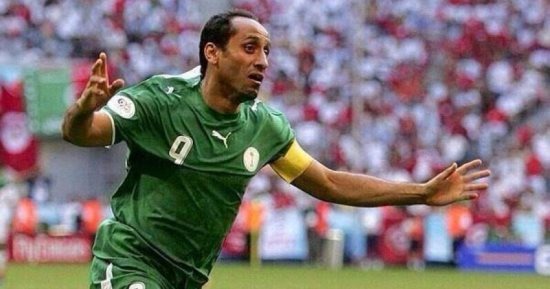Led by Sami Al-Jaber.. Gulf stars that sparkled in the World Cup sky

25 matches played by the Arab Asian teams in the eight editions in which they participated during the World Cup finals, including 16 matches at once for the Saudi national team in five copies, in addition to three matches for each of Iraq, Kuwait and the UAE during one copy for each team, and 25 goals is the largest number of goals was received by a goalkeeper in the history of the World Cup finals (a negative number), registered in the name of our Arab goalkeeper and former world player dean, Muhammad Al-Deayea, and he shares this number with Antonio Carvajal with the Mexican national team.
Faisal Al-Dakhil (The King) recorded his name in the Arab records after he scored the first goal for a Gulf national team (Kuwait), in the 1982 edition, against Czechoslovakia in the 57th minute on June 17, 1982, to give Al-Azraq a tie after the opponent was ahead with a goal by the legend Antonin Panenka from a penalty kick, and in the same version, Abdulaziz Al Balushi also scored, so that the two stars signed the blue goal in his only participation in the World Cup.
In the World Cup Mexico 1986, the legend of the Lions of Mesopotamia, Ahmed Radi, scored Iraq’s first goal against Belgium, in the 59th minute on June 8, 1986, and the match ended with Iraq losing 1/2.
In the 1990 World Cup in Italy, and in the only World Cup participation for the UAE national team, it was the turn of Khaled Ismail, who scored his famous and historic goal in the 46th minute against West Germany, in the match that was held on June 15, 1990, and the match ended with the loss of Al-Abyad 1/5.
Fouad Anwar opened the goals of Saudi Arabia against the Netherlands on June 20 in the World Cup America 1994, and Al-Akhdar lost 1/2, in the first appearance of the Saudi green in the World Cup, while the star Sami Al-Jaber leads the ranking of Arab scorers in the World Cup with three goals, as he scored his first goal from Penalty kick against Morocco in the same version in the United States of America.
As for Al-Jaber’s second goal, it was against South Africa in the 1998 World Cup in France, and it also came from a penalty kick, while his third goal was against the Tunisian national team in the 2006 World Cup in Germany.
The 1990 edition in Italy witnessed the Emirati Khaled Ismail scoring a goal against Germany, and Ali Jumaa scored a goal against Yugoslavia.
Saudi Al-Akhdar star Saeed Al-Owairan scored a historic goal against Belgium, as well as Fahd Al-Ghashyan against Sweden, with the best version of Al-Akhdar over the course of 5 World Cup matches.
In the 1998 edition, the star Youssef Al-Thunayan scored a goal against South Africa, and in the 2006 World Cup, Yasser Al-Qahtani scored a goal against Tunisia.
In the historic participation of Al-Akhdar in the 1994 World Cup finals, Saudi Arabia signed in Group F alongside Netherlands, Belgium and Morocco, and Al-Akhdar was able to reserve a seat in the round of 16 for the first and only time in its history, as it ranked second behind Netherlands, after scoring six points, ahead of Belgium by goal difference, and behind Netherlands on goal difference as well.
Saudi Arabia managed to defeat Belgium with the historic goal of Saeed Al-Owairan, in the manner of Maradona, and beat Morocco with two goals to one. Al-Akhdar met the Dutch national team in the first match of the tournament, and despite losing by two goals to one goal, Fouad Anwar was the owner of the first Saudi goal in the World Cup, and scored his goal in the 18th minute, giving precedence to Al-Akhdar, before the mills returned and scored two goals to settle the match in their favour.
Thus, Sami Al-Jaber leads the scoring scene for Gulf football in the World Cup with three goals, followed by Fouad Anwar with two goals, compared to one goal for Saeed Al-Owairan, Fahd Al-Ghashyan, Youssef Al-Thunayan, Yasser Al-Qahtani, Salem Al-Dosari, and Salman Al-Faraj from Saudi Arabia only, along with a goal for each of the stars of Kuwait, Faisal Al-Dakhbel, Abdulaziz Al-Balushi, Iraq Ahmed Radi, and the Emirates Khaled Ismail and Ali Juma.

